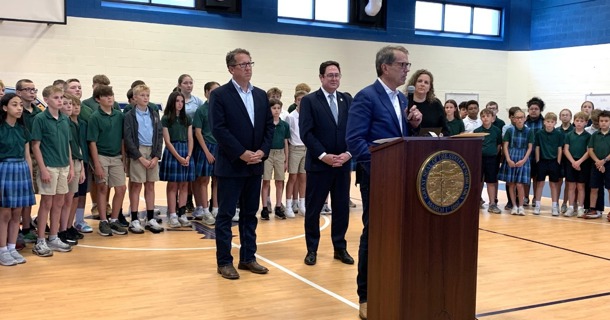Surrounded by Students, Gov. Pillen Signs Order Opting into Federal Scholarship Tax Credit

LINCOLN, NE – Surrounded by students, staff, parents and members of Nebraska’s congressional delegation, Governor Jim Pillen signed an executive order at St. Teresa Catholic School in Lincoln, indicating the state’s intent to opt into the Federal Scholarship Tax Credit. Signed into law by President Donald Trump this summer as part of the One Big Beautiful Bill, this program paves the way for new school choice opportunities beginning in 2027.
“This program is a game-changer for Nebraska students and their families, generating funds that will help send students to the school of their choice,” said Gov. Pillen. “When it comes to educating our kids, we need to ensure that every student is in an environment that allows them to succeed. This program provides that opportunity, and I’m pleased to say that Nebraska will take part.”
The Federal Scholarship Tax Credit allows individual taxpayers to direct up to $1,700 to a qualified scholarship granting organization (SGO) in exchange for a 100% dollar-for-dollar credit on their federal income taxes. SGO’s will send donated funds to families to be used for eligible K-12 education expenses, including costs associated with attending private school. SGO’s can retain up to 10 percent of the donations for administrative costs.
“Through this program, up to 90 percent of K-12 Nebraska students in any educational setting could qualify for scholarships for high-quality resources,” said U.S. Rep. Adrian Smith, member of the Ways and Means Committee.
“Our students are our future, and I championed inclusion of this legislation in the Working Families Tax Cut package to empower parents with greater educational opportunity for their children. Thanks to Governor Pillen’s intention to opt-in to the program, Nebraska families can benefit from potentially billions of donated dollars leveraged by this program,” he added.
“Whether it’s a public school, private school, home school, or a hybrid of these options, parents have a right to direct the upbringing and education of their kids. The Working Families Tax Cut bill, which I supported earlier this year, included the first major nationwide school choice program,” added U.S. Rep. Mike Flood. “Thanks to Congressman Smith for championing this measure over the years and to Governor Pillen for opting our state in so Nebraskans can access more educational opportunities for their kids.”
Opting in is just one requirement of the program. In addition, participating students must be eligible to attend a public school, and families must earn no more than 300 percent of their area median income (AMI). The U.S. Department of the Treasury is expected to provide additional regulation around the program moving forward.
Sarah Schinstock grew up in Lincoln, attending St. Mary’s School. Of her seven children, six attend St. Teresa Catholic School. Her oldest daughter, who is disabled, attends public school. Schinstock said sending her kids to a faith-based school was an important choice for her and her husband, but it would not have been possible without scholarship assistance.
“Opting in to the federal school choice program will help us tremendously. It will provide more lasting scholarship money to aid us with tuition. Now, we will be empowered with the help we need to make the best educational decisions for our children.”
Nebraska remains one of two states with no formal school choice program. In 2023, the Nebraska Legislature passed LB753, the Opportunity Scholarships Act, which created a tax credit program for donations made to SGOs. In 2024, that legislation was repealed by lawmakers and replaced with LB1402, which created a state-appropriated $10 million program managed through the State Treasurer’s Office, to direct funds to private school scholarships for low-income, special needs and other students. Later that same year, voters repealed the law following a heavily funded national and state-run effort to put the issue on the ballot.
“The teachers union has tried at every turn to thwart the efforts of our lawmakers to deliver any measurable support for school choice at the state level. And ultimately, that cost has come at the expense of our most vulnerable students,” said Gov. Pillen. “This federal program marks a significant step forward in providing them with that educational freedom, at no cost to the state.”
Gov. Pillen said his administration will work with school choice advocates to produce a list of qualified SGOs for the Treasury Department to consider, prior to January 1, 2027.
“I’m very grateful to Nebraska’s federal congressional delegation for passing the One Big Beautiful Bill and to Rep. Smith in particular, for his specific advocacy through the Ways and Means Committee,” said Gov. Pillen.
